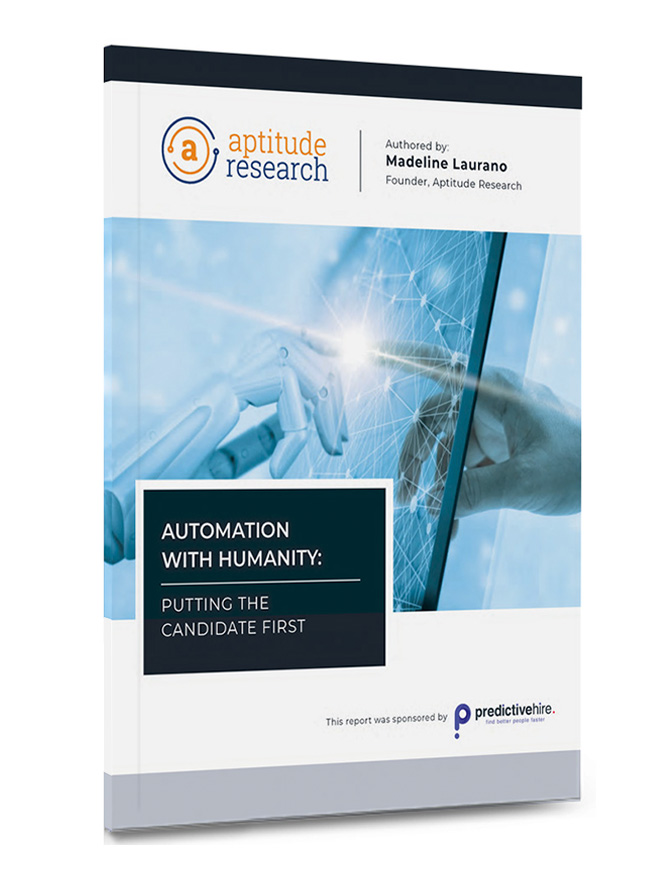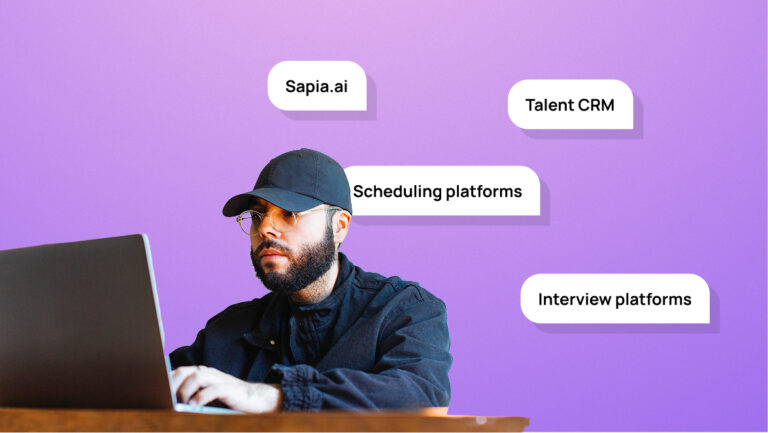Four ways recruitment automation is giving candidates a more human experience

To find out how to improve candidate experience using Recruitment Automation, we also have a great eBook on candidate experience.
New insights from Aptitude Research suggest recruitment automation can play a much greater role in talent acquisition than just improving efficiency for hiring managers, it can also make the interview process more human for candidates.
The research shows that when you shift the focus from an employer-driven view to a candidate-first view, then it is possible to reduce bias in hiring and improve the overall human element of talent acquisition.
For most companies, the value of automation is perceived through the recruiter and hiring manager experience, with the benefits to the candidate often ignored. However, recruitment automation has to be about more than simply moving candidates through the process quickly to have any significant benefit to a company.
When you focus on the impact and experience of the candidate, the benefits to both recruiters and candidates can significantly improve through recruitment automation. This approach has given rise to a movement called humanistic automation technology.
But humanistic automation sounds like an oxymoron right? Is it even possible?
The Aptitude Research showed not only is this possible, but that when Ai is used this way, it creates personal connection at scale, and works to reduce bias, something no other technology or even human-centred solution can deliver.
So, how exactly does it do this?
Here are four main areas of talent acquisition that candidate-focussed recruitment automation improves on,and how it achieves this:
1. Connection
There have been some slight improvements in building connections through the hiring process recently, but only 50% of companies have a single point of contact for communication, which results in candidates feeling engaged or valued through the process.
Recruitment automation with a candidate-focus means that communication is personalised for high-engagement with the ability for the conversation to adapt to what it learns about a candidate almost immediately.
As a candidate finding out that you are not successful is tough, and worse, most companies just ghost those they don’t wish to move ahead with. Automation can ensure that every candidate is engaged and cared for even when they are not moving forward in the process – and that doesn’t mean a standard rejection email. Ai can deliver highly personalised communication that builds connection even for those unsuccessful in their application.
2. Inclusivity
Although some companies have made efforts to remove bias from resumes, companies still have a lot of work to do on inclusion. For starters, many are relying on training programs, which have shown to be largely ineffective in delivering long-term change.
It’s true that recruitment automation can amplify bias, but automation that works to reduce bias is continually testing against biases in the system and has been shown to be effective in reducing the impact of bias in hiring decisions. Somethings humans cannot do (we’re inherently biased, whether we like it or not).
When you have the right data input gathered through blind screening and blind interviews – that don’t rely on CV data – then you can help companies achieve an equal and fair experience to all candidates.
Want to remove bias from recruitment and not just talk about it?
Download the Inclusive Hiring e-Book here
Inclusive hiring is not limited to gender and race. Companies need a broader view of diversity, equity, and inclusion that includes individuals with disabilities and neurodiversity. This requires the right digital tools and technology to ensure that candidates have a positive experience. In many cases, chat and text are more inclusive over video or even phone screening and interviews for these candidates.
3. Feedback
Most companies see feedback as a risky area and something they have no ability to do in a fair and timely manner. Essentially this is a lost opportunity for learning and development.
When you see feedback as a value proposition of an employer brand, its power in transforming your TA strategy becomes clear. Recruitment automation allows companies to deliver personalized feedback building trust and strengthening your employer brand.
Personalized feedback with tangible action items, means that candidates feel empowered even if they are rejected. Technology can help to deliver these action items in a human way, that even humans are not able to do at scale or even very well.
These insights are only made possible through natural language processing and machine learning that work in the background to reveal important information about the candidate. When a candidate feels like they are ‘seen’ that can be a transformational moment in their career paths.
Only recruitment automation can deliver individual feedback to everyone who takes time to do a job interview.
4. Trust
In an era of growing awareness around the privacy of data, only 1 in 4 candidates trust the data being will be used to drive hiring decisions. As companies look at recruitment automation through a candidate-centric lens, they must consider both the quality of the data they use and how to build trust between employers and candidates.
The biggest mistake that most companies make is using the wrong data. Resume data is not necessarily an indicator of performance or quality of hire.
Ethical Ai is something that hiring managers need to understand and use to evaluate providers. Providers using ethical Ai operate transparently, are backed by explanations, describe their methodology, and frequently publish their data.
Aptitude Research found that when data is transparent, it increases the trust in talent acquisition leaders, hiring managers, and senior leaders. With data transparency, 84% of talent acquisition leaders stated that they trust the data, and 78% of senior leaders trust the data.
Talent acquisition transformation has accelerated the demand for recruitment automation.
55% of companies are increasing their investment in recruitment automation this year. These companies recognise that automation can improve efficiency, lift the administrative burden, reduce costs, and enable data-driven decisions.
This report focuses on a new look at automation through the eyes of the candidate
After all, automation is more than moving candidates through a process quickly. It should also enable companies to communicate in a meaningful and inclusive way and build trust between candidates and employers.



